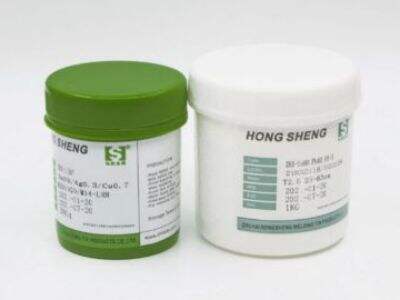A solder wire is a very vital instrument which utilized by many individuals with various occupations. It is helpful to be utilized in material joining, very convenient in repairing electronics, plumbing and vehicles. There are many different types of solder cord available, each with various characteristics suitable for particular applications. This tutorial will look at the various types of solder wire, what they do and why they do it, so you can better comprehend what they are and why they are required.
Types of Solder Wire
The solder wire is of two kinds, and they are lead-based and lead-free solder wire. Solder wire with low lead content. This results in the solder wire melting at low temperatures, and thus be able to flow freely into solder joints to be soldered. This too is a kind of solder wire widely used in electronics due to the fact that it forms very strong joints that hold up well in the long run.
Instead, lead-free solder wire is more used since it is safe and less toxic to use. This kind of solder wire has different types of metals like silver, copper and tin. Well, they are safe and do not have the same kind of risks as lead. Lead-free solder wire does have a higher melting point, but most people like to use it because it is nice to the planet and for the human body, so it is worth spending money on.
Choosing the Best Solder Wire
There are several things to remember every time you need to determine what right solder wire is appropriate for some specific task. First, consider what the materials are that you're attempting to join. Salvaging Components Some solder wire is designed for some of these materials. You also have to think about how tightly you wish to make the bond. In most tasks, relatively strong bonds are required, in others not as much.
Also look at any legislation that controls lead use. From electronics, lead solder wire can be your appropriate option since it is strong and reliable. However, if there are no legislations allowing the use of lead-based solder wire, then lead-free solder wire is an appropriate option. Additionally, it is extremely crucial to test if your selected solder wire has quality with your utilized materials to assist in making a good strong and long while connection.
Type of Solder Wire Advantages and Disadvantages
We shall examine the strengths and weaknesses of both solder wires. Solder wire is very easy to apply and very reliable, and Lead-based solder wire is no different. It is also of low melting point, and it produces solid connections which are long lasting. It is useful and even dangerous due to the presence of lead. The lead is poisonous to our bodies, and even to the environment if not destroyed in the appropriate manner.
Lead-free solder wire is safer to use and for the environment. Since it contains no lead, it has none of the health issues associated with it. Lead-free solder consists of silver and tin and melts at a higher heat than lead so it will be slightly harder to use than lead solder wires. Aside from problems, lead-free solder wire is simply more in demand by industries because of the priority it places on safety.
Other Industries Briefly and Applications of Solder Wire
solder paste for Various Industries Solder wire with lead is commonly applied in the electronics sector to form permanent connections between components on a printed circuit board. It also has a relatively low melting point, thus it can be efficiently utilized with delicate semiconductor pieces that might get destroyed by the application of heat.
For example, in case of plumbing, lead-free solder wire workers would install lead-free solder wire to assemble the copper pipe unions. Solder wire is safer for drinking systems of the potable water because of complying with safety code and standards to do with the content of lead. Currently, we have to utilize the right solder wire that won't render the water unsafe to consume.
Automotive Soldering: Solder wire is utilized by auto technicians to fix wiring and electrical components on cars. To stay in compliance with a green future, lead-free solder wire is utilized most frequently in car repair.
Tips for Successful Soldering
When soldering, employ the appropriate solder wire on your project. Clean any surfaces to be soldered well before you start. This makes the solder stick tighter and with a better weld. To get a good joint, heat the solder wire and the things you are soldering at an equal rate. It is also best to practice improving soldering technique.
If you're soldering solder paste lead, make sure that you're somewhere a little ventilated. And I mean ventilated so that you don't inhale the poisonous vapors. After the work is done, wash your hands properly so that it will not be absorbed from hand to mouth. Greater melting point if you're using lead-free solder wire as well, heating them up for longer times to melt the solder wire beautifully. This should all go smoothly.
So, make sure you use the right type of solder wire, and using these tips will lead to great results. You can also experiment with trying other solder wires to see what will work best for your individual projects and needs.
Conclusion
Hence, leaded solder paste is a crucial tool used to put together materials in different works. Understanding the different types of solder wire and why you require them is the beginning to selecting the right one for you. If you do most of your work with electronics, plumbing, or cars, the right solder wire selection is crucial in establishing strong connections. Just don't mind using the soldering tips to make the most out of the work. So, that's the solder wire types tutorial and its usage, thanks for reading!
 EN
EN
 AR
AR
 FR
FR
 DE
DE
 RU
RU
 VI
VI
 TH
TH
 TR
TR
 MS
MS
 BE
BE


